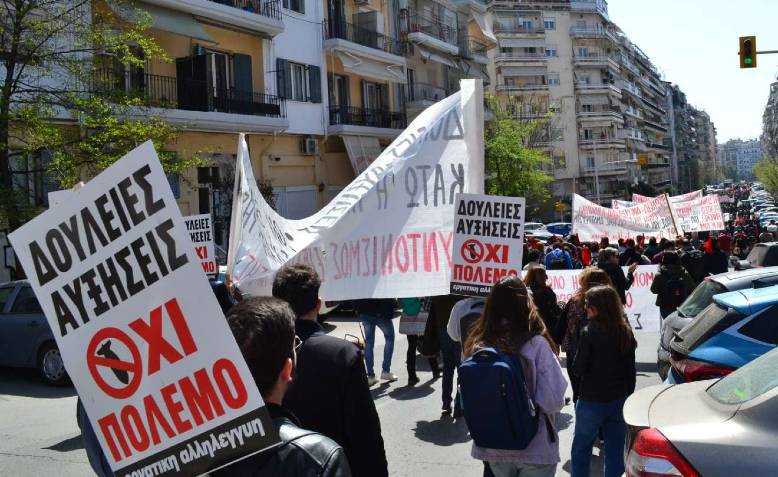 Greece general strike, Thessaloniki. Photo: Εργατική Αλληλεγγύη / Facebook
Greece general strike, Thessaloniki. Photo: Εργατική Αλληλεγγύη / Facebook
Greek workers shutdown the country in a national 24-hour general strike calling for higher wages in the face of rising costs and in clear opposition to war and militarism, reports Kevin Ovenden
A 24-hour general strike across the public and private sectors brought Greece to a standstill on Wednesday. The demand from the rallies and protests, and from millions staying away from work was for generalised wage rises across all sectors to address the cost of living crisis.
Transport was out. From ferries to the islands, the Metro in Athens, to trains and buses across the country.
Hospitals on emergency admissions. Schools closed. Riot police tear-gassing pickets at the port of Thessaloniki, with six arrested. But the ports were closed anyway.
And despite the lack of transport (sometimes transport unions limit their action to allow others to join demonstrations) there were big rallies in the cities and towns.
The scale and participation in this strike are greater than for years, though there has been a rising curve of strikes and demonstrations over the last year.
This felt like the combative strikes of the period of fighting the austerity memorandums that led up to the election of the left-wing Syriza government in 2015.
That government’s capitulation to the forces of austerity coordinated by the EU and IMF brought bitter demoralisation and also posed hard questions over how the left could recover, especially with the return of the conservative right in 2019.
Yet if one word were to sum up today’s mass working-class action it would be “confidence”.
An arrogant right-wing government was only months ago speculating that it could call an election before summer and reinforce itself for another four years.
But the scale of the cost-of-living crisis coming off the back of the sacrifices people have made over Covid – despite an incompetent government – has provoked a reaction.
Already there had been strikes in hospitals and other areas demanding that the vandalism of the austerity memorandum years be repaired now that there was money being pumped out by central banks and governments all over the place.
There were civil protests against the government slipping in authoritarian measures in the false name of fighting Covid.
And now we have spiralling prices for fuel and food, with pro-Nato and right-wing ideologues trying to blame all that on Russia for invading Ukraine. There have been several big mobilisations in the last four weeks for Russian withdrawal but against expanding Nato or Greek military capacity.
These sentiments came together today. Whether from organised left forces or as widespread sense this was a mass strike for pay – that is shifting wealth from the bosses to workers – and an anti-war action.
It is particularly acute in Greece as it is already in the top five of spending on the military as a percentage of the economy. In February the government announced the purchase of four new French-built warships.
The military budget is set to rise. Wages in Greece have not recovered to 2010 levels.
So today’s strike and protests condensed these issues into a highly political event. A further factor was the participation, pronounced in the demonstration in Athens, of refugees and immigrants in organised blocs.
The hypocrisy of a government that claims to welcome (white) Ukrainians while putting black and brown refugees in prison camps has not gone unnoticed. The moral argument goes beyond the convinced radical left.
There will be more strikes. There are many questions about how to advance the struggle to win. But for now, there is a real sense in Greece that all sorts of struggles and people have found each other – from the delivery drivers who won a big victory last year to recognised as employees not freelancers to the refugees sinking deeper roots into the society.
Above all, the message from many involved in Wednesday’s actions may be summed up as this: collective working-class action has great power – the government seems shocked and had expected a ritualistic affair. Struggles and issues are coming together.
And good politics against the bosses and their wars can help on all fronts.
As one popular slogan today said:
Jobs
Wages
No to war
Before you go
The ongoing genocide in Gaza, Starmer’s austerity and the danger of a resurgent far right demonstrate the urgent need for socialist organisation and ideas. Counterfire has been central to the Palestine revolt and we are committed to building mass, united movements of resistance. Become a member today and join the fightback.

